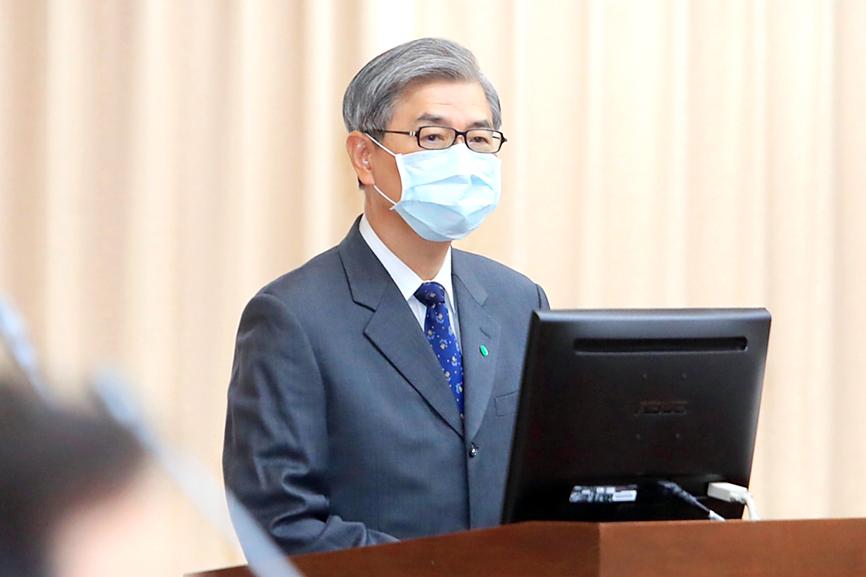The Financial Supervisory Commission (FSC) is later this month to begin a special examination of the nation’s top 10 mortgage lenders to see if banks exercise solid risk management, FSC Chairman Thomas Huang (黃天牧) said on Monday.
The commission would examine the first bank this month and complete the special examination by March, Huang said at a meeting of the legislature’s Finance Committee in Taipei.
He did not identify the banks.

Photo: CNA
The examination would focus on banks’ risk assessment for extending luxury housing loans, construction loans and loans to developers who put their unsold houses up as collateral, Huang said.
Whether banks have complied with the central bank’s credit controls, such as the loan-to-value requirements, would also be part of the commission’s inspection, he said.
Besides the special examination, the commission’s regular banking inspections would focus on commercial real-estate lending, Huang added.
Asked whether banks play a role in pushing up housing prices, Huang said that more data would be needed to reach a conclusion.
“Housing prices are affected by many factors,” Huang said. “What the FSC can do is to ensure that banks exercise solid risk controls and comply with regulations.”
The central bank on Monday announced that it was tightening its credit controls to prevent an excessive flow of credit to the property market.
The FSC said that in its special examination it would pay close attention to banks regarding the central bank’s new measures.
The central bank’s new measures include capping the loan-to-value ratio at 60 percent for housing loans granted to corporate buyers for their first property and at 50 percent for their second, while the limit on the ratio for an individuals’ third property is set at 60 percent.
As for loans granted to developers who use unsold houses as collateral, the central bank is capping the ratio at 50 percent.

NEW IDENTITY: Known for its software, India has expanded into hardware, with its semiconductor industry growing from US$38bn in 2023 to US$45bn to US$50bn India on Saturday inaugurated its first semiconductor assembly and test facility, a milestone in the government’s push to reduce dependence on foreign chipmakers and stake a claim in a sector dominated by China. Indian Prime Minister Narendra Modi opened US firm Micron Technology Inc’s semiconductor assembly, test and packaging unit in his home state of Gujarat, hailing the “dawn of a new era” for India’s technology ambitions. “When young Indians look back in the future, they will see this decade as the turning point in our tech future,” Modi told the event, which was broadcast on his YouTube channel. The plant would convert

‘SEISMIC SHIFT’: The researcher forecast there would be about 1.1 billion mobile shipments this year, down from 1.26 billion the prior year and erasing years of gains The global smartphone market is expected to contract 12.9 percent this year due to the unprecedented memorychip shortage, marking “a crisis like no other,” researcher International Data Corp (IDC) said. The new forecast, a dramatic revision down from earlier estimates, gives the latest accounting of the ongoing memory crunch that is affecting every corner of the electronics industry. The demand for advanced memory to power artificial intelligence (AI) tasks has drained global supply until well into next year and jeopardizes the business model of many smartphone makers. IDC forecast about 1.1 billion mobile shipments this year, down from 1.26 billion the prior

People stand in a Pokemon store in Tokyo on Thursday. One of the world highest-grossing franchises is celebrated its 30th anniversary yesterday.

Zimbabwe’s ban on raw lithium exports is forcing Chinese miners to rethink their strategy, speeding up plans to process the metal locally instead of shipping it to China’s vast rechargeable battery industry. The country is Africa’s largest lithium producer and has one of the world’s largest reserves, according to the US Geological Survey (USGS). Zimbabwe already banned the export of lithium ore in 2022 and last year announced it would halt exports of lithium concentrates from January next year. However, on Wednesday it imposed the ban with immediate effect, leaving unclear what the lithium mining sector would do in the